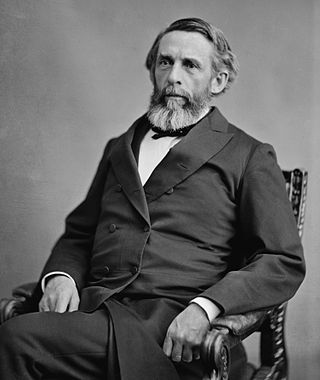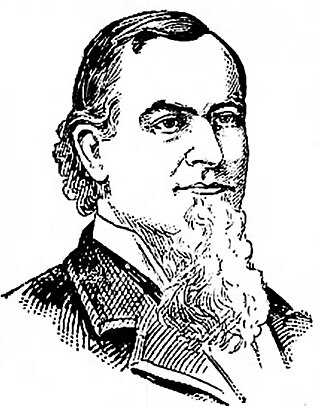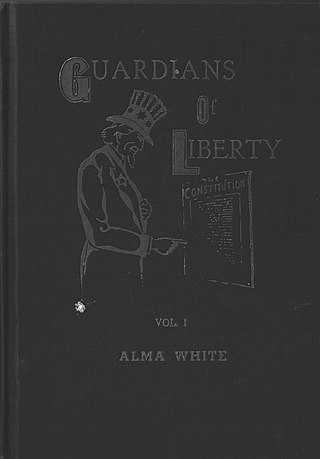

William James Henry Traynor (born July 4, 1845 in Brantford, Ontario) was a Canadian-American anti-Catholic political activist. He is best known for heading the American Protective Association, a nationalist and anti-Catholic organization. [1]


William James Henry Traynor (born July 4, 1845 in Brantford, Ontario) was a Canadian-American anti-Catholic political activist. He is best known for heading the American Protective Association, a nationalist and anti-Catholic organization. [1]
He moved to Detroit, where he was editor of the anti-Catholic weekly, The Patriotic American, [2] and was elected Supreme Grand Master of the Loyal Orange Institution of the United States. [3]
Traynor was elected Supreme President of the American Protective Association in 1893, and he continued to head that organization during its peak of influence in the middle 1890s. He continued to lead that organization until APA founder Henry F. Bowers was returned as the group's leader in 1903.

The Philadelphia nativist riots were a series of riots that took place on May 6—8 and July 6—7, 1844, in Philadelphia, Pennsylvania, United States and the adjacent districts of Kensington and Southwark. The riots were a result of rising anti-Catholic sentiment at the growing population of Irish Catholic immigrants. The government brought in over a thousand militia—they confronted the nativist mobs and killed and wounded hundreds.
The Protestant Protective Association was an anti-Catholic group in the 1890s based in Ontario, Canada, associated with the Orange Order. Originally a spinoff of the American group the American Protective Association, it became independent in 1892. The PPA denounced the role of Catholics and French-Canadians in politics, and warned Protestants that Catholics were attempting to take over Ontario. It aimed to eliminate French language education in schools in Ontario and western Canada, and to roll back or block Catholic school systems in those provinces.

The American Anti-Imperialist League was an organization established on June 15, 1898, to battle the American annexation of the Philippines as an insular area. The anti-imperialists opposed forced expansion, believing that imperialism violated the fundamental principle that just republican government must derive from "consent of the governed." The League argued that such activity would necessitate the abandonment of American ideals of self-government and non-intervention—ideals expressed in the United States Declaration of Independence, George Washington's Farewell Address and Abraham Lincoln's Gettysburg Address. The Anti-Imperialist League was ultimately defeated in the battle of public opinion by a new wave of politicians who successfully advocated the virtues of American territorial expansion in the aftermath of the Spanish–American War and in the first years of the 20th century.

Anti-Catholicism is hostility towards Catholics or opposition to the Catholic Church, its clergy, and/or its adherents. At various points after the Reformation, some majority Protestant states, including England, Prussia, Scotland, and the United States, turned anti-Catholicism, opposition to the Pope (anti-Papalism), mockery of Catholic rituals, and opposition to Catholic adherents into major political themes. The anti-Catholic sentiment which resulted from this trend frequently led to religious discrimination against Catholic communities and individuals and it occasionally led to the religious persecution of them Historian John Wolffe identifies four types of anti-Catholicism: constitutional-national, theological, popular and socio-cultural.

Laurence Gronlund was a Danish-born American lawyer, writer, lecturer, and political activist. Gronlund is best remembered for his pioneering work in adapting the International Socialism of Karl Marx and Ferdinand Lassalle to the American idiom in his popular 1884 book, The Cooperative Commonwealth, and for his influence upon the thinking of utopian novelist Edward Bellamy, newspaper publisher Julius Wayland, and the American socialist movement of the 1880s and 1890s.

The American Protective Association (APA) was an American anti-Catholic secret society established in 1887 by Protestants. The organization was the largest anti-Catholic movement in the United States during the later part of the 19th century, showing particular regional strength in the Midwest. The group grew rapidly during the early 1890s before collapsing just as abruptly in the aftermath of the election of 1896.

Henry Francis Bowers was an American attorney and political activist. Bowers is best remembered as the founder of the American Protective Association, a staunchly anti-Catholic secret political society.
John William Higham was an American historian, scholar of American culture, historiography and ethnicity. In the 1950s he was a prominent critic of Consensus history. Historian Dorothy Ross says, "The multi-ethnic environment of his early life in Queens, the wartime optimism, and his immersion in Progressive history, with its fundamental faith in American democracy, gave him a vision of an egalitarian, cosmopolitan, American nationalism in which he never lost faith."

The Know Nothing party was a nativist political party and movement in the United States in the mid-1850s. The party was officially known as the "Native American Party" prior to 1855 and thereafter, it was simply known as the "American Party". Members of the movement were required to say "I know nothing" whenever they were asked about its specifics by outsiders, providing the group with its colloquial name.
Anti-Catholicism in the United States concerns the anti-Catholic attitudes first brought to the Thirteen Colonies by Protestant European settlers, composed mostly of English Puritans, during the British colonization of North America. Two types of anti-Catholic rhetoric existed in colonial society and they continued to exist during the following centuries. The first type, derived from the theological heritage of the Protestant Reformation and the European wars of religion, consisted of the biblical Anti-Christ and the Whore of Babylon variety and it dominated anti-Catholic thought until the late 17th century. The second type was a secular variety which was partially derived from xenophobic, ethnocentric, nativist, and racist sentiments and distrust of increasing waves of Roman Catholic immigrants, particularly from Ireland, Italy, Poland, Cuba, and Mexico. It usually focused on the pope's control of bishops, priests, and deacons.
Nativism is the political policy of promoting or protecting the interests of native or indigenous inhabitants over those of immigrants, including the support of immigration-restriction measures.
American ancestry refers to people in the United States who self-identify their ancestral origin or descent as "American," rather than the more common officially recognized racial and ethnic groups that make up the bulk of the American people. The majority of these respondents are visibly White Americans, who are far removed from and no longer self-identify with their original ethnic ancestral origins. The latter response is attributed to a multitude of generational distance from ancestral lineages, and these tend be Anglo Americans of Scotch-Irish, English, Welsh or other British ancestries, as demographers have observed that those ancestries tend to be recently undercounted in U.S. Census Bureau American Community Survey ancestry self-reporting estimates. Although U.S. Census data indicates "American ancestry" is most commonly self-reported in the Deep South, the Upland South, and Appalachia, a far greater number of Americans and expatriates equate their nationality not with ancestry, race, or ethnicity, but rather with citizenship and allegiance.
The Knights of Equity (KOE) is an Irish Catholic fraternal organization established in the US in 1895 and still in active operation in the 21st century. The group is among the oldest Irish-Catholic membership associations in America. With some 65 local chapters, called "courts", during its period of greatest influence, the group was an important Catholic political and fraternal benefit society. The early society organized Irish Catholics in America against discrimination, and gave financial aid to impoverished Irish immigrants.

American Freedom and Catholic Power is an anti-Catholic book by American writer Paul Blanshard, published in 1949 by Beacon Press. Blanshard asserted that America had a "Catholic problem" in that the Church was an "undemocratic system of alien control". The book has been described as propaganda and as "the most unusual bestseller of 1949–1950". Some reviewers thought that the book incorporated nativist sentiments into its anti-Catholicism, including that the Church was a foreign power in America determined to dominate the world. In the prolog, Blanshard said that he was not opposed to the Catholic religion or to Catholic Americans, but that the church's hierarchy had an undue influence on legislation, education and medical practice.
In the 19th century, members of the Catholic Church made several unsuccessful attempts to culturally integrate themselves into the mainstream American culture. Only during the 20th century did this fully succeed, with the election of John F. Kennedy, a practicing Catholic, to the presidency of the United States in 1960.

Guardians of Liberty is a three volume set of books published in 1943 by Bishop Alma Bridwell White, author of over 35 books and founder of the Pillar of Fire Church. Guardians of Liberty is primarily devoted to summarizing White's vehement anti-Catholicism under the guise of patriotism. White also defends her historical support of and association with the Ku Klux Klan while significantly but not completely distancing herself from the Klan. Each of the three volumes corresponds to one of the three books White published in the 1920s promoting the Ku Klux Klan and her political views which in addition to anti-Catholicism also included nativism, anti-Semitism and white supremacy. In Guardians of Liberty, White removed most, but not all of the direct references to the Klan that had existed in her three 1920s books, both in the text and in the illustrations. In Volumes I and II, she removed most of the nativist, anti-Semitic and white supremacist ideology that had appeared in her predecessor books. However, in Guardians Volume III, she did retain edited versions of chapters promoting nativism, anti-Semitism and white supremacy.
In United States politics, the radical right is a political preference that leans towards extreme conservatism, white supremacism, or other right-wing to far-right ideologies in a hierarchical structure paired with conspiratorial rhetoric alongside traditionalist and reactionary aspirations. The term was first used by social scientists in the 1950s regarding small groups such as the John Birch Society in the United States, and since then it has been applied to similar groups worldwide. The term "radical" was applied to the groups because they sought to make fundamental changes within institutions and remove persons and institutions that threatened their values or economic interests from political life.

The 1900 United States elections elected the 57th United States Congress. The election was held during the Fourth Party System. Republicans retained control of the Presidency and both houses of Congress, while third parties suffered defeats.

Kaspar Kap Kubli, Jr., was an American politician in the state of Oregon. Closely associated with the Ku Klux Klan, Kubli, a member of the Republican party, was elected Speaker of the Oregon House of Representatives in 1923. Among legislation passed under Kubli during his five terms of office include the Oregon Criminal Syndicalism Act in 1919.

Nativism in United States politics is opposition to an internal minority on the basis of its supposed “un-American” foundation. Historian Tyler Anbinder defines a nativist as:
someone who fears and resents immigrants and their impact on the United States, and wants to take some action against them, be it through violence, immigration restriction, or placing limits on the rights of newcomers already in the United States. “Nativism” describes the movement to bring the goals of nativists to fruition.